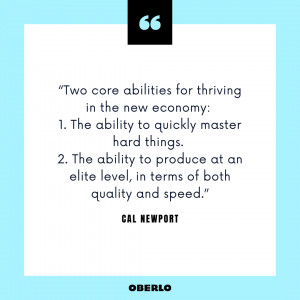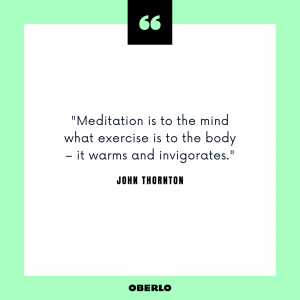Want to train your brain for success? Good idea.
Your thoughts determine what you do and how you react to life’s situations. As a result, how you think has a massive impact on your level of success and happiness. And thankfully, it’s possible to train your mind to be stronger in almost any way you like.
However, changing the way we think isn’t exactly a walk in the park.
In fact, years of bad habits and unconscious automatic thought patterns can make training your brain very challenging. So, how can you get started?
In this article, you’ll learn how to train your brain, seven mind sharpening exercises, and three essential brain training tips.
Let’s jump in.
Post Contents



How to Train Your Mind to Be Stronger
Before we dive into specific brain training techniques, let’s take a quick look at how to train your mind to be stronger.
Dr. John N. Morris is the director of social and health policy research at the Harvard-affiliated Institute for Aging Research. He believes there are three main guidelines you should follow when training your mind:
- Do Something Challenging: Whatever you do to train your brain, it should be challenging and take you beyond your comfort zone.
- Choose Complex Activities: Good brain training exercises should require you to practice complex thought processes, such as creative thinking and problem-solving.
- Practice Consistently: You know the saying: practice makes perfect! Dr. Morris says, “You can’t improve memory if you don’t work at it. The more time you devote to engaging your brain, the more it benefits.”
Another important thing to remember is that you shouldn’t try to do several brain training exercises at once – it will make it far more difficult to practice consistently. Instead, pick one mind training activity and do it consistently every day for a month or so. Once it becomes a habit, add something new.
So, what should you practice?
How to Train Your Brain for Success: 7 Mind Training Techniques
Cal Newport, a professor of computer science and best-selling author, believes there are “two core abilities for thriving in the new economy:
- The ability to quickly master hard things.
- The ability to produce at an elite level, in terms of both quality and speed.”

In other words, you need to learn how to: stop procrastinating, learn fast, focus intently, and be more productive.
So, how can you do this? Here are seven brain training exercises to practice:
1. Single-Task
These days many people rarely do just one thing at a time: Have you ever watched TV while browsing social media, emailed someone while getting your morning coffee, or read a book while listening to music?
Here’s the thing: Multi-tasking, skim-reading, and hopping from task to task may seem effective, but in reality, it’s the opposite.
“We keep loading ourselves down so we’re mentally exhausted all the time. Our battery is too worn down to really engage in deeper-level thinking and be more efficient,” said Sandra Bond Chapman, the founder and chief director of the Center for Brain Health at the University of Texas.
Producing at an elite level requires focus.
So, if you want to train your brain so you can produce more work at a higher standard, you need to condition your mind to do one thing at a time. Slow down and practice focusing 100% on the task at hand.
2. Meditate
The businessman and professor John Thornton said, “Meditation is to the mind what exercise is to the body – it warms and invigorates.”

Science has shown that mindfulness meditation helps engage new neural pathways in the brain. These pathways can improve self-observational skills and mental flexibility – two attributes that are crucial for success.
What’s more, another study found that “brief, daily meditation enhances attention, memory, mood, and emotional regulation in non-experienced meditators.” That said, the study also found that eight weeks of consistent, brief daily meditation were needed to reap the benefits.
So, stick with it – it works.
You can learn how to train your brain with meditation from teachers like Joseph Goldstein and Tara Brach or by using apps like Headspace and Calm.

3. Reframe Negative Thoughts
Most people think negative thoughts from time to time, but these thoughts can prevent us from achieving our goals. The Roman philosopher-emperor Marcus Aurelius knew the power of our minds and wrote in Meditations, “Our life is what our thoughts make it.”
Thankfully, you can train your brain to be positive by reframing negative thoughts whenever you notice them.
How? Practice self-awareness.
Whenever you feel low, check-in with yourself and try to identify the negative thought-loop at play. Perhaps you’re thinking something like, “who cares,” “I’ll never get this right,” “this won’t work,” or “what’s the point?”
When you catch these intrusive thoughts, practice replacing them with new ones, such as: “practice makes perfect,” “I’m okay,” “failure is just feedback,” “if I keep working hard, I’ll get there in the end.”
If this feels a little fake when you start, it’s okay! Look for evidence to support your new perspective. For example, if you think, “this will never work,” list at least one reason why it could work.

4. Use Your Memory More
It might sound obvious, but one of the best ways to train your brain is to rely on your memory more often.
For example, if you have a to-do list or shopping list, try to remember the next item before checking the list. You could also memorize your debit card numbers, friends’ phone numbers, license plates, and addresses.
Get into the habit of committing things to memory.
These simple mind sharpening exercises are likely to increase your comprehension when learning other things.
5. Read
Another way to train your brain is to read often, preferably every day.
Science has proven that reading can enhance your cognitive function, develop your language skills, and increase your attention span.
Plus, not only does the act of reading train your brain for success, but you’ll also learn new things!
The founder of Microsoft, Bill Gates, said, “Reading is still the main way that I both learn new things and test my understanding.”
If you’re looking for reading material, check out our guides covering 40 must-read books and the best books for entrepreneurs.

6. Learn Something New
What better way is there to practice learning than simply learning something new?
If you want to train your brain for success, here’s what to do: Determine what you want to achieve, then reverse engineer the steps you need to take to achieve it – and learn about each step as you go.
For example, say that you want to start a business. Let’s reverse-engineer how to do it:
- Learn about ways to make money so you can choose a type of business to start (i.e., learn about dropshipping, affiliate marketing, consulting, etc.)
- Learn all about your chosen business model (i.e., Learn how to dropship)
- Identify the first step you need to take to get started and learn about it (i.e., How to find products to sell)
- Work out the second step and learn all about it (i.e., How to build an online store)
- Etc.
Whether you learn to bake, do origami, or build a business, consider taking a free online course to learn something new.
7. Use Brain Training Apps
If you like to play games, why not play ones that also train your brain?
There are many different brain training apps on the market, many of which are free. Here are some free brain training apps that have been proven to strengthen neural pathways and enhance your cognitive abilities:

3 Essential Tips to Help You Train Your Brain
Now that you know some different ways to train your brain for success let’s explore some ways to maximize your results.
1. Consume Less Media
Consuming a lot of media can have a negative effect on your cognitive abilities.
“The more information we download or take in, the more shallow our thinking is, and the more fragmented our brain systems are,” said Sandra Bond Chapman, the founder of the Center for Brain Health.
“It’s counterintuitive because we think that if ‘I could just take in 20 things and quickly absorb them, I would be smarter,’ and the science has shown that the smartest leaders are those who know from the get-go to literally block out some information.”
In other words, less is more.
If that’s not enough, another study found that heavy social media users weren’t able to switch from one task to another as effectively as moderate to light social media users. “These results suggest that heavy media multitaskers are distracted by the multiple streams of media they are consuming,” the study authors wrote.
So, think quality, not quantity.
Watch one TV episode, not three. Read one news story, not seven. And check out five Instagram posts, not 30 minutes’ worth.
Professor Cal Newport summed it up nicely when he wrote, “Efforts to deepen your focus will struggle if you don’t simultaneously wean your mind from a dependence on distraction.”

2. Develop Your Social Life
Our brains are receiving signals and new information constantly. So, if you want to train your brain effectively, you need to improve the things that influence your mind all day, every day.
And one of the strongest influences on our minds is the people we spend time with.
You may be familiar with the entrepreneur Jim Rohn’s famous quote, “You are the average of the five people you spend the most time with.” This may be why friendship groups tend to share similar interests, attitudes, and ideas.
So, evaluate how your social life affects the way you think and operate.
Ideally, you want to surround yourself with an intelligent and diverse group of people who inspire you to improve yourself and work on your goals.
Now, although the COVID-19 pandemic has made it tricky to meet new people, we still have the internet. So, whilst being mindful of tip (consumer less media), get involved in Facebook groups and network on Twitter to engage with inspiring people.

3. Lead a Healthy Lifestyle
The state of your physical health has a dramatic effect on your mind.
One study shows that habitual exercise can improve memory and brain function over time. Another study found that exercising for 20-30 minutes three times per week will improve your long-term memory.
If that’s not enough evidence, according to a Harvard study titled “Nutritional Psychiatry: Your Brain on Food,” a nutritious diet can help to improve brain function.
When writing about the study, Dr. Eva Selhub suggests that you “start paying attention to how eating different foods makes you feel — not just in the moment, but the next day. Try eating a ‘clean’ diet for two to three weeks — that means cutting out all processed foods and sugar. See how you feel. Then slowly introduce foods back into your diet, one by one, and see how you feel.”
All in all, you can improve your brain training efforts with a healthy diet and some exercise.
Summary: How to Train Your Mind for Success
The state of your mind has a massive effect on your success and happiness.
When learning how to train your brain, the activities you choose should be challenging and complex. They should also train your brain to learn new things quickly, focus intently, and be productive.
Here are seven ways to train your mind for success:
- Single-task
- Meditate daily
- Reframe negative thoughts
- Rely on your memory more
- Read often
- Learn new things
- Use brain training apps
Finally, here are three tips to help you get more from your brain training exercises:
- Consume less media
- Spend more time with people that inspire you
- Exercise regularly and eat a nutritious diet
Remember, training your mind to be stronger takes time. So, whatever you do, be consistent and your efforts will pay off in the long run.






